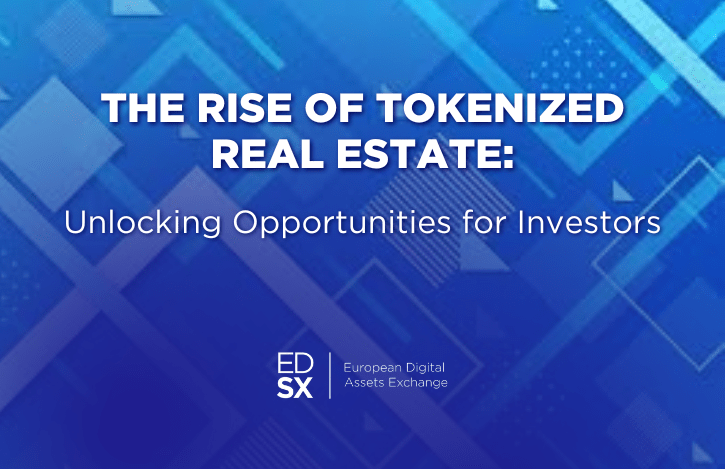For a considerable period, the real estate market has maintained its reputation as a conventional and relatively illiquid asset class, effectively restricting the accessibility of profitable investment prospects for numerous prospective investors. Nevertheless, the rise of tokenized real estate, driven by the advent of blockchain technology, is ushering in a transformative era for the industry. This innovation is democratizing real estate investment, reshaping the methods of property acquisition, transaction, and ownership. This article delves into the realm of real estate tokenization, elucidating its mechanisms, advantages, challenges, and the potential it harbors for small-scale investors, while contemplating its implications for the future of the real estate market.
I. Real Estate Tokenization: A Paradigm Shift in Property Ownership
Tokenization is the process of converting tangible assets, like real estate, into digital tokens stored on a blockchain. Tokens signify fractional shares of properties, allowing access to high-value assets previously out of reach. This division makes real estate more accessible to small-scale investors who lacked traditional financial capacity.
Tokenization centers around blockchain, a decentralized and secure platform for storing and transferring tokens. Smart contracts, embedded in the blockchain, govern property terms, ensuring transparent and trustless transactions. Embracing it allows individuals and companies to shape the real estate market’s digital age future.
II. Benefits of Real Estate Tokenization
- Increased Liquidity and Accessibility: Traditionally, real estate has been considered illiquid, with properties requiring substantial capital and lengthy processes for buying and selling. Tokenization addresses this issue by enabling fractional ownership, allowing investors to buy as well as sell smaller shares of properties with ease. This newfound liquidity enhances market dynamism and makes real estate investment more accessible to a wider pool of investors.
- Transparency and Efficiency: Blockchain’s decentralized structure ensures immutability and transparency of transactions, eliminating the need for intermediaries and enhancing efficiency. Smart contracts automatically execute transactions based on predefined conditions, minimizing human intervention and the potential for human errors or unfair dealings. This transparency and automation improve the overall transaction process and foster investor confidence.
- Decentralization and Reduced Counterparty Risks: Tokenization eliminates the need for intermediaries, reducing counterparty risks and making transactions more secure as well as traceable. The decentralized nature of blockchain technology empowers stakeholders to make collective decisions, creating a more equitable and stable investment environment.
III. Challenges and Potential Risks
- Regulatory Frameworks: One of the primary challenges facing real estate tokenization is the lack of a consistent regulatory framework governing the market. Different jurisdictions have varying rules and regulations surrounding digital assets, leading to confusion and uncertainty for investors and issuers alike. The absence of a centralized reporting system for tokenized real estate transactions can also hinder transparency and complicate regulatory compliance.
- Smart Contract Security: While blockchain is renowned for its security, smart contracts are not immune to vulnerabilities and exploitation. Smart contract security loopholes pose potential risks and could erode investor trust, hindering the growth of tokenized real estate. Diligent auditing and security measures are essential to safeguard tokenized assets.
- Complex Licensing Requirements: Tokenization of real estate assets requires licensed platforms to regulate operations and management of security token offerings (STOs). The process of obtaining licenses is complex, involving multiple phases of trial and error and recurrent tests to achieve success.
- Regulatory Uncertainty and Tax Complexities: Cryptocurrency tax regulations are undefined in many tax regimes, creating uncertainty for stakeholders. The lack of a unified tax system may create doubts as well as complications for those involved in tokenized real estate investments.
IV. Embracing the Potential of Tokenized Real Estate
Despite the challenges, real estate tokenization has the potential to revolutionize the industry. It offers benefits while also presenting opportunities for small-scale investors. It opens doors for individuals to invest in high-value properties as well as diversify their portfolios. By reducing intermediaries and streamlining transactions, tokenization makes real estate investment more transparent and efficient.
As technology advances as well as regulatory frameworks develop, the full potential of tokenized real estate will become increasingly evident. Companies exploring this innovative investment option should seek guidance from experienced professionals to navigate the complexities of the emerging market successfully.
Real estate tokenization represents a transformative shift in the industry, redefining property ownership, and expanding investment opportunities. Through fractional ownership and the use of blockchain and smart contracts, tokenization introduces transparency, efficiency, and accessibility to the real estate market. Although challenges remain, such as regulatory frameworks and smart contract security, the benefits of tokenized real estate outweigh the risks.
Real estate tokenization, evolving, empowers small investors, offers portfolio diversification. Overall, embracing it lets individuals and companies shape the future of the real estate market in the digital age.

Based in Zug, the platform is fully compliant with all Swiss laws related to financial intermediaries, banking, anti-money laundering, and organized trading facilities. Among its core values, there are innovative solutions through blockchain technology, which ensures security and liquidity.
EDSX is the first platform in Europe with primary and secondary markets for both institutional and retails. EDSX is a pioneering platform that employs the world’s leading technology to globally list security tokens in both primary and secondary markets, listing digital securities of real financial instruments to the public with a decentralized peer-to-peer exchange. Our goal is to fully engage every aspect of the financial revolution.
Do you have a question for us?
Send your query here:
[email protected]

